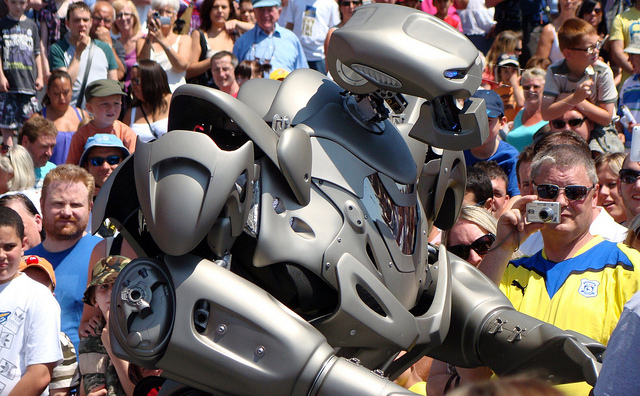Computers are gaining on writers, and that’s a good thing
If you’ve heard of companies like Narrative Science, which use computers to do things like write college football game stories, you might be worried about a dystopian journalistic future where robots have all the jobs.
Journalism professor and programmer Matt Waite has some advice for you: “stop. Just stop.”
In How to write 261 leads in a fraction of a second on Poynter.org, Waite walks readers through the relatively simple task of programming a computer to do the work of a human writer, only way, way quicker. The headline is literal: Once you’ve got a dataset and you’ve set up your commands, you’re one keystroke away from writing those 261 ledes.
And that number could just as easily be 261,000 with the right dataset.
This, Waite writes, is nothing to worry about:
If a bot can write a better story than you can, it’s not you: it’s the story. It’s a crappy story and a human being shouldn’t be writing it.
Bots can write basic stories. Some of them can do a pretty decent job, even. Get over it.
What will bots never be able to do? Be human. Humans are flawed, empathetic, complex beings, and no bot will ever be able to capture the human experience through writing the way a human can.
There is no algorithm for humanity.
Yet. Heh-heh.
But seriously. For those of us not technically inclined, Waite’s explanation of exactly how to program a computer to turn spreadsheet rows and columns into prose sentences is pretty interesting.
And he makes an important point: The very basics of writing, the foundation of much of it, can be spelled out in rules that a machine can understand. Most of us don’t think of writing that way. We think of it as an art. And it is an art. But try describing a black cat running under a parked car by writing, “The cat black runned car parked above it.” Any grade-schooler could correct that sentence by knowing some simple grammar rules. So could a computer.
This is not an insult. Your brain is a kind of computer, a very sophisticated one. What feel like simple, natural actions—taking a bite of food with a fork, for example, or writing a simple sentence—are actually complex sequences of decisions and calculations.
Machines are getting much, much smarter. They’re catching up to us to the point where they can write simple stories, such as game recaps. As Waite points out, that just means that we as writers can concentrate on writing the more human, humane stories that computers can’t approach.
It also means we have to.
* * *
Photo: Titan the Robot by Jon Candy. Flickr Creative Commons.


